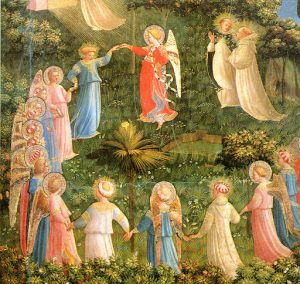Archive, Readings
Desert Fathers 46
You can find this episode in video format here – a dedicated page – and pick it up in audio wherever you listen to podcasts. On YouTube, the full range of episodes can be found here.
They say about Abba John the Dwarf that one day he told his elder brother: ‘I wish to live without cares, like the angels, who are without cares, not having to work but ceaselessly offering praise to God.’ Then, untying his garment, he went into the desert. After a week he came back to his brother. When he knocked on the door, [his brother] heard him from within. Before opening, he said: ‘Who are you?’ And he said: ‘I am John’. But [his brother] answered, saying: ‘John has become an angel! He no longer dwells among men’. So he besought him and said: ‘It’s me! Open for me!’ But he did not open, leaving him afflicted until the next morning. When eventually he did open, [his brother] said: ‘You see, you are a man after all. If you want to eat, you will once again have to work.’ At that, [John] prostrated himself and said: ‘Forgive me!’
Abba John the Dwarf is a towering presence in the Desert. A pupil of Pambo, a teacher to Arsenius, his authority was held in high regard. It was John, short of stature, who as a novice was given a task destined to become legendary. His elder took a dry stick, plonked it in arid ground, and instructed John to water it daily ‘until it should bear fruit’. The only well was so far away that John, to draw from it, had to leave in the evening and come back the next day, spending all his time, and most of his strength, on an exercise that seemed, to all intents and purposes, not only useless, but a kind of mockery. John, though, persevered. And at ‘the end of three years the wood came to life and bore fruit. Then the elder took some of the fruit and carried it to the church, saying to the brethren, “Take and eat the fruit of obedience”.
Andrei Tarkovsky, the master cinema director, used this story as a framework for his final essential feature, the film Sacrifice released in 1986, the year of his death. He invoked John the Dwarf’s silent, trustful, patiently gratuitous work, a source of paradoxical fecundity, as a corrective to the forceful yet insubstantial impact of ‘Words, words, words’, an exclamation from Hamlet uttered in despair by the intellectual Alexander, the film’s protagonist, when he considers his own trajectory of spouted hot air.
It is touching to find John, an illustrious specimen of monastic virtue, falling prey, at a given moment, to illusion. His intention is noble enough. Taking stock of his life, John considers that too much effort goes into chores. Did he become a monk to work in the kitchen, weave baskets, and attend to practical needs that are often dull? Had he not opted for an angelic life, the transformation of his whole existence into praise? When this thought came to him, he lived with his own brother.
That is, I should think, relevant information. Family relationships are complex. If the Lord let a third of the apostolic college consist of pairs of brothers, it was partly to show how blood-ties must be illumined by a supernatural call. There may, for all we know, have been a latent quarrel in the shared hermitage. Did John sometimes think along the lines ‘Argh! He has always had a way of dodging the dishes!’? Given the fraternal straightforwardness that marks the exchanges after John’s return, a dynamic of this sort may have contributed to tension felt, in any case, by those who embrace a life of spiritual pursuits when they discover the continued exigence of practical life, those times when Benedictines dream of becoming Cistercians, Cistercians hanker after the Charterhouse, and Carthusians dream of a solitary mountain-top with steep access.
John wished to live an angelic life. So off he went, loosening his robe, no more needing, now, the girdle or apron with which he had tied it in for efficient work. He had forgotten one thing, though: angels have no need for supper. Also, they are never quite on their own. Theology shows them to us configured in choirs and hierarchies. We do not know what went through John’s head during seven days and seven nights in isolation under the vast desert sky, with the distant calls of jackals his only perceptible company. In any case, life at home with his brother no longer seemed so awful. Perhaps, he mused, one might after all live a God-pleasing life there, too.
Schadenfreude, spontaneous pleasure in others’ misfortune, especially when they have acted against our advice, is no monastic trait. Among brothers, however, it can find licit expression, and is not always wholly incompatible with charity. John’s brother reinforces the lesson circumstance had taught the ex-hermit. ‘Ah! My angelic fratello of whose company I was not worthy!’ He let John spend a further night out in the cold, just to bring the point home. Then he volunteered a wholly Biblical correction — for already St Paul had written to the Thessalonians, a lot rather given to airy-fairy religion: ‘If any one will not work, let him not eat.’
The end of the story is typical of this genre of literature. Nonetheless it is surprising and beautiful. John does not waste time on explanations. He does not go into some long tirade about how he had felt when he decided to leave, how accumulated frustration had made life a trial. To seek to justify himself even implicitly would have seemed to him both a waste of time and somehow unworthy. He says simply: ‘Forgive me’, and assumes the full weight of his mistake.
Therein lies this story’s principal lesson.

Detail from Fra Angelico’s Last Judgement.
